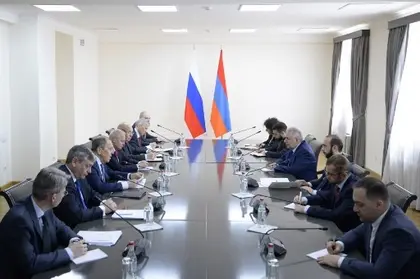Fresh hostilities broke out between Armenia and Azerbaijan in the Nagorno-Karabakh region last week. As a result, nearly 100 people have been killed in the busiest week of violence in the region since 2020. Azerbaijan has likely been pushing its advantage knowing that Russia, the traditional guarantor of stability in the region, is distracted by its invasion of Ukraine.
Baku was right. Armenian Prime Minister Nikol Pashinyan last week formally asked the Moscow-led Collective Security Treaty Organization (CSTO) security alliance to intervene by triggering collective defense Article IV which obliges the organization to protect its states. Russia did not give a helping hand.
JOIN US ON TELEGRAM
Follow our coverage of the war on the @Kyivpost_official.
Russia has been trying to show for years that NATO is a toothless alliance. Two can play that game. Now is the time for NATO to turn the tables on Moscow’s information warfare by using information operations to show how the CSTO is not a credible alliance.
Russia has historically considered NATO as a threat, and Moscow has been searching for a weak link in the alliance for years. Moscow has looked on with alarm as NATO expanded in Eastern Europe from the 1990s on, and in 2008 Putin declared NATO’s eastward expansion a “direct threat.” In December 2021, Putin demanded that NATO guarantee that it would not expand eastward. Putin then made veiled nuclear threats after Finland and Sweden’s announcement of their intention to join NATO in the wake of Russia’s invasion of Ukraine. Since the invasion, the Kremlin has been accusing NATO of waging a proxy war with Russia.

ISW Russian Offensive Campaign Assessment, January 21, 2025
Russia has been trying to paint NATO as a paper tiger for a long time. While direct conflict between Russia and the West is highly unlikely, Moscow has been searching for NATO’s weak links. Moscow’s hope has been to engage NATO in a local conflict that NATO leaders refuse to go to war over, exposing Article 5 as an empty promise. Western leaders’ rhetoric has not helped their case. In 2018 French President Emmanuel Macron has said that NATO is experiencing “brain death.” In 2018, US President Donald Trump wondered aloud whether the US should defend “tiny” Montenegro upon the country’s accession into NATO.
Putin could not be happier with these statements, and Moscow has been working to inflame ethnic tensions and protests in NATO member states in the Balkans by engaging in information operations and activating its proxies in the region. For example, Serbia, a de facto Russian proxy, has recently escalated tensions over Kosovan license plates in an effort by the Kremlin to test NATO’s willingness to intervene in a local conflict. Similarly, Moscow has been stoking religious tensions in Montenegro through the Serbian Orthodox Church. Moscow was also blamed for massive cyber-attacks in two NATO member states, Montenegro and Albania, in September.
Although NATO said that it would intervene in the case of escalation in Kosovo last month, Russian media was spreading messages that NATO would abandon Kosovo should push come to shove. The West, however, could learn a thing or two from Russia’s recent anti-NATO efforts; it is Russia, not the West, who is unreliable in protecting its allies – and NATO should tell the world about it.
Russia’s refusal to step in and help Armenia has not gone unnoticed by the people of Armenia. Moscow is technically treaty-bound to protect Armenia in the event of a defensive conflict, but has preferred to play the role of mediator since the conflict intensified in 2020. As a result, last Sunday, hundreds of people gathered in Yerevan asking Armenia to leave the CSTO, the Moscow-led security bloc that establishes Moscow’s responsibility to defend Armenia.
The recent anti-CSTO protests in Armenia provide the perfect opportunity for NATO to expose Russia’s unreliability. NATO should use information operations to reach out to Russia’s traditional allies in places like Belarus, Kazakhstan, Moldova or the Balkans and tell them the truth – that Russia refused to help its treaty-bound ally, Armenia, when they needed help the most.
Reaching out to African leaders would be important, too. Russia has been using the information space in Africa to accuse the US and its allies of the war in Ukraine and blame the West for food shortages there. Syria’s Bashar al-Assad is another ripe target. Wholly reliant on Russian largesse for his position and power, he should be made aware of just how feeble and fickle Moscow really is.
Rather than cletting Russia exploit NATO, Putin needs to understand that if his regime continues to undermine the alliance, he can expect equal and opposite pressure on the CSTO –courtesy of NATO.
You can also highlight the text and press Ctrl + Enter










